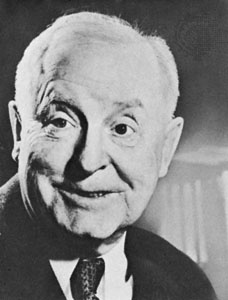White, William Allen
American journalist
born Feb. 10, 1868, Emporia, Kan., U.S.
died Jan. 29, 1944, Emporia
 American journalist known as the “Sage of Emporia,” whose mixture of tolerance, optimism, liberal Republicanism, and provincialism made him the epitome of the thoughtful small-town American. His editorial writing made his own small-town newspaper, the Emporia Gazette, internationally known, and strongly affected at least one U.S. presidential election.
American journalist known as the “Sage of Emporia,” whose mixture of tolerance, optimism, liberal Republicanism, and provincialism made him the epitome of the thoughtful small-town American. His editorial writing made his own small-town newspaper, the Emporia Gazette, internationally known, and strongly affected at least one U.S. presidential election.White left the University of Kansas, Lawrence, in 1890 to become business manager of the El Dorado (Kan.) Republican. After writing editorials for the Kansas City Star from 1892 to 1895, he purchased the Emporia Daily and Weekly Gazette. His editorial “What's the Matter with Kansas?” (Aug. 15, 1896) was an impassioned attack on populism, a political doctrine dedicated to agrarian interests and the free coinage of silver. Reprinted and widely circulated by the national chairman of the Republican Party, the editorial was credited with helping to elect William McKinley as president over William Jennings Bryan, the Democratic candidate and the hero of the populists.
In 1912 White repudiated the mainstream of Republicanism to support the “Bull Moose” faction (the Progressive Party) led by Theodore Roosevelt. “To an Anxious Friend,” an editorial of July 27, 1922, advocating freedom of speech, won the 1923 Pulitzer Prize for editorial writing. In 1924 White unsuccessfully ran as an independent for governor of Kansas. He wrote several novels and short-story collections, biographies of Woodrow Wilson and Calvin Coolidge, and an autobiography (posthumous, 1946).
His son and successor as editor and publisher of the Gazette, William Lindsay White (1900–73), served as a war correspondent and wrote one of the best-selling books of World War II, They Were Expendable (1942).
- Quelimane
- Quemoy Island
- quenching
- Queneau, Raymond
- Quennell, Sir Peter
- Quenstedt, Friedrich August
- Quental, Antero Tarquínio de
- Quentin Massys
- Querandí
- quercitron bark
- Quercy
- Queremistas
- Querido, Israël
- quern
- Quervain, Marcel Roland de
- query language
- Querétaro
- Quesnay, François
- Quesnel
- Quesnel, Pasquier
- Quetelet, Adolphe
- Quetico Provincial Park
- Quetta
- quetzal
- Quetzalcóatl